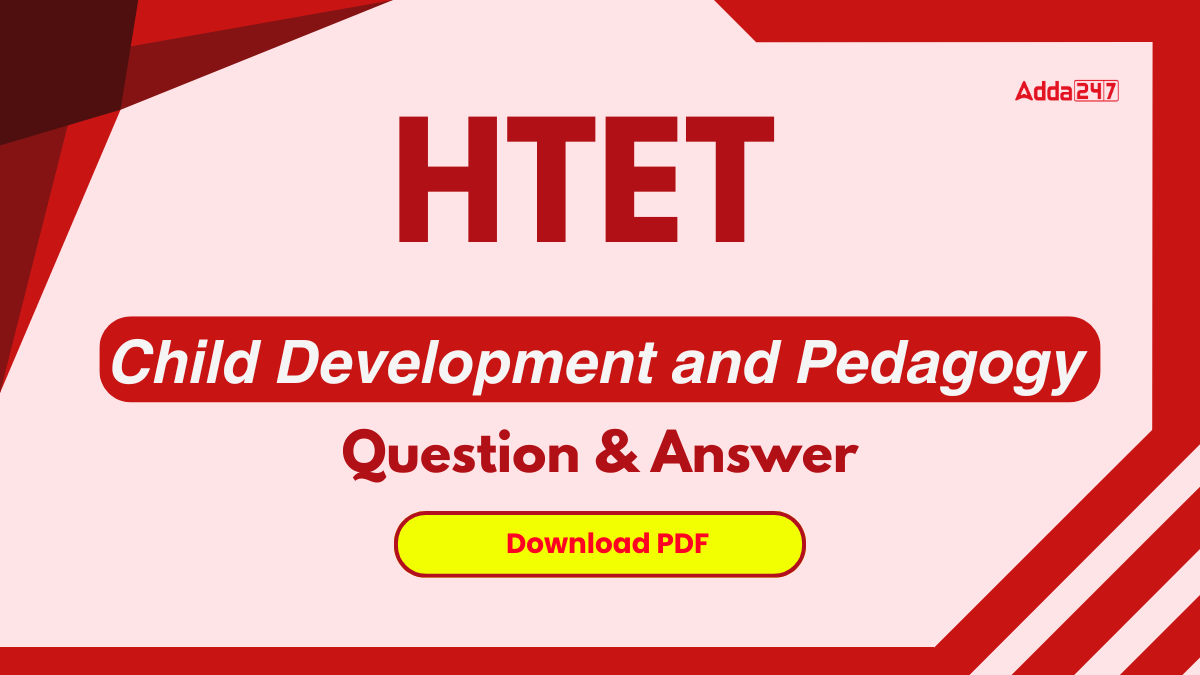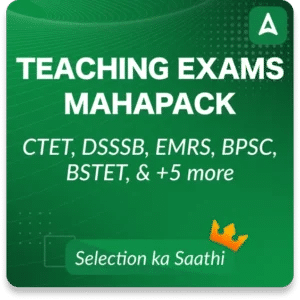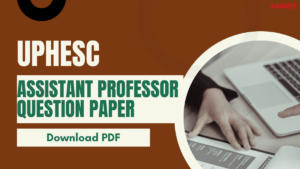Table of Contents
The HTET 2024 (Haryana Teacher Eligibility Test) is a state-level examination organized by the Board of School Education, Haryana (BSEH). Scheduled for 7 and 8 December 2024, the exam is essential for candidates aiming to qualify for teaching positions as Primary Teachers (PRT), Trained Graduate Teachers (TGT), and Post Graduate Teachers (PGT) in Haryana schools. The HTET includes three levels: Level-1 for PRT, Level-2 for TGT, and Level-3 for PGT. Aspirants should stay updated with the official announcements and guidelines to ensure thorough preparation for this crucial examination.
HTET CDP Question and Answer
To excel in the HTET 2024, candidates must prioritize their preparation for the Child Development and Pedagogy (CDP) section, as it plays a crucial role in all three levels of the exam. The CDP section assesses a candidate’s understanding of child psychology, teaching methods, and classroom management strategies. Topics such as theories of child development, inclusive education, learning and teaching methodologies, and assessment techniques should be studied thoroughly. Regular practice with previous years’ question papers and mock tests can enhance familiarity with the question pattern and improve time management. A deep conceptual understanding of CDP will not only help secure good marks but also strengthen a candidate’s overall performance in the HTET exam. To help the candidates with practice questions for HTET CDP, we have arranged free question and answer with detailed explanation.
HTET CDP Question: Overview
The HTET 2024 (Haryana Teacher Eligibility Test) will be conducted by the Board of School Education, Haryana (BSEH) at the state level on 7 and 8 December 2024. The exam, held annually, will be conducted offline in a pen-and-paper format and will last for 2 hours and 30 minutes. With a total of 150 multiple-choice questions, the exam carries 150 marks, with 1 mark awarded for every correct answer and no negative marking. Offered in bilingual language options (English and Hindi), the HTET 2024 aims to determine the eligibility of candidates for teaching positions as Primary Teachers (PRT), Trained Graduate Teachers (TGT), and Post Graduate Teachers (PGT) in government schools across Haryana.
| HTET Exam Date 2024 | |
| Exam Name | Haryana State Teacher Eligibility Test (HTET ) |
| Conducting Body | Board of School Education, Haryana (BSEH) |
| Exam Level | State-level |
| Exam Frequency | Once in a year |
| Exam Mode | Conventional (pen and paper) |
| Exam Duration | Two and a half hours |
| Total Marks | 150 Marks (30 Marks dedicated to CDP Section) |
| Total Questions | 150 Questions (30 Questions dedicated to CDP Section) |
| Language | Bilingual ( English and Hindi) |
| Exam Purpose | To offer eligibility to teaching aspirants for Primary Teachers (PRT), Trained Graduate Teachers (TGT), and Post Graduate Teachers (PGT) in Government Schools in Haryana |
HTET CDP Questions and Answers
Q1. Which stage of development is characterised by dealing with issues of finding one’s own identity and abstract thinking?
(a) Infancy
(b) Early childhood
(c) Middle childhood
(d) Adolescence
Q2. Which of the following statements given below is NOT correct about the principles of development?
(a) Development follows particular sequence.
(b) Development follows differentiation and integrations.
(c) Development follows toe-to-head direction.
(d) Development follows center-to-periphery direction.
Q3. The primary cause of individual differences in children is:
(a) Only genetic make up of the individual.
(b) Only the child rearing style of the parents.
(c) The complex interplay of heredity and environment.
(d) Only the physical environment of the child.
Q4. Socialization is a:
(a) linear and fixed process
(b) simple and uni-dimensional process
(c) complex and multi-dimensional process
(d) rigid and universal process
Q5. Jean Piaget suggested that
(a) childern think and learn differently from adults.
(b) language facilitates the development of cognition.
(c) children thinking is quantitively different from that of adults.
(d) are born as blank slate and are unintelligent at birth.
Q6. Which of the following is a correctly matched pair?
(a) Infancy – 6-11 years
(b) Middle childhood – 2 – 6 years
(c) Formal operational stage – 11 years and above
(d) Pre-operational stage – birth till 2 years
Q7. A major critique of Kohlberg’s theory of moral development is that:
(a) It does not specify stages.
(b) It disregards the effect of cultural factors and gender on moral thinking.
(c) It uses participant observations of childern in naturalistic settings.
(d) It does not give a fixed sequence of moral development.
Q8. Lev Vygotsky believed that:
(a) Children passively reproduce what is presented to them.
(b) Children construct their own understanding by support from adults
(c) Children learn by associating stimulus with response.
(d) Children learn when presented with appropriate materialistic rewards.
Q9. In his theory of cognitive development, Lev Vygotsky gave a lot of importance to psychological tools such as:
(a) language
(b) calenders
(c) calculators
(d) mobiles
Q10. In a progressive classroom:
(a) language
(b) calenders
(c) calculators
(d) mobiles
Q11. Individuals who demonstrate are acutely aware of their feelings and can show an appreciation for themselves.
(a) Logico-mathematical intelligence
(b) Bodily-kinaesthetic intelligence
(c) Intrapersonal intelligence
(d) Linguistic intelligence
Q12. Which of the following behaviours by teachers help to reduce gender stereoty ping and discrimination in children?
(a) Asking only boys to pick up heavy furniture in class
(b) Giving toy dolls and houses to only girls
(c) Referring to care giving professions for women only
(d) Inculcating qualities autonomy and empathy in all genders
Q13. Which perspective considers language to be an important tool that facilitates cognition?
(a) Behaviouristic
(b) Information-processing
(c) Socic-cultural
(d) Psycho-dynamic
Q14. Which of the following is not an effective strategy to accommodate diversity in a classroom?
(a) Finding out the student’s social and cultural context of the students
(b) Adapting pedagogy as per the students” different backgrounds
(c) Providing a variety of examples that are meaningful to all students
(d) Using a standard set of instructions and ignoring the background of learners
Q15. Which of the following should characterise assessment for meaningful learning?
(a) Standardised
(b) Comprehensive
(c) Formative
(d) (b) and (c) both
Solutions for HTET CDP Questions
S1. Ans. (d)
Sol. Adolescence is the stage of development characterized by issues of identity and abstract thinking. During adolescence (d), individuals grapple with understanding who they are and where they fit in society. This is also the time when abstract and hypothetical thinking becomes more prevalent, allowing for more complex thought processes compared to earlier stages.
S2. Ans. (c)
Sol. The incorrect statement about principles of development is that it follows a toe-to-head direction (c). Development typically follows a cephalocaudal (head-to-toe) and proximodistal (center-to-periphery) pattern, meaning it progresses from the head downward and from the center of the body outward, not the other way around.
S3. Ans. (c)
Sol. The primary cause of individual differences in children is the complex interplay of heredity and environment (c). While genetics and upbringing both significantly influence development, it’s their interaction that shapes an individual’s unique characteristics. Neither factor works in isolation; instead, they continually interact to determine development.
S4. Ans. (c)
Sol. Socialization is a complex and multi-dimensional process (c). It involves learning and adopting the norms, values, behaviours, and social skills appropriate to one’s society from childhood into adulthood. It’s influenced by various factors including family, education, peer groups, and media, making it multifaceted and complex.
S5. Ans. (a)
Sol. Jean Piaget suggested that children think and learn differently from adults (a). He believed that cognitive development proceeds through specific stages, each marked by unique characteristics that differ qualitatively from those of adults. His theory emphasizes that children’s thinking is not just a less sophisticated version of adult thinking.
S6. Ans. (c)
Sol. The correctly matched pair is the Formal operational stage – 11 years and above (c). According to Piaget’s stages of cognitive development, the formal operational stage starts at approximately 11 years old and is characterized by the ability to think abstractly and reason about hypothetical problems.
S7. Ans. (b)
Sol. A major critique of Kohlberg’s theory of moral development is that it disregards the effect of cultural factors and gender on moral thinking (b). Critics argue that Kohlberg’s stages, derived from studies on a narrow demographic, don’t adequately consider how different cultural backgrounds and gender can influence moral reasoning and ethical behaviour.
S8. Ans. (b)
Sol. Lev Vygotsky believed that children construct their own understanding with support from adults (b). His theory, known as the sociocultural theory of cognitive development, emphasizes the fundamental role of social interaction and cultural tools in the development of cognition. He argued that learning is a collaborative process where adults and more knowledgeable others provide scaffolds to help children learn and think more complexly.
S9. Ans. (a)
Sol. In his theory of cognitive development, Lev Vygotsky gave a lot of importance to psychological tools such as language (a). He considered language as the most significant symbolic tool that influences thought and understanding. Vygotsky believed that through language, cultural knowledge is transmitted, and it serves as a pivotal tool in cognitive development.
S10. Ans. (d)
Sol. In a progressive classroom, ‘direct experience’ and ‘discussions’ are the basis for learning (d). This approach emphasizes hands-on learning and encourages students to construct their own knowledge through experiences and interactions, rather than through passive reception of information or rote memorization.
S11. Ans. (c)
Sol. Individuals who demonstrate intrapersonal intelligence (c) are acutely aware of their feelings and can show an appreciation for themselves. Howard Gardner’s theory of multiple intelligences identifies intrapersonal intelligence as the capacity to understand oneself, to appreciate one’s feelings, fears, and motivations.
S12. Ans. (d)
Sol. Behaviors by teachers that help reduce gender stereotyping and discrimination in children include inculcating qualities of autonomy and empathy in all genders (d). By promoting these qualities universally, teachers can help break down traditional gender roles and encourage children to develop their strengths and interests, regardless of gender.
S13. Ans. (c)
Sol. The perspective that considers language to be an important tool that facilitates cognition is the socio-cultural perspective (c). This perspective, largely influenced by the work of Lev Vygotsky, views language as a critical tool for communication, thought, and social interaction, which in turn drives cognitive development.
S14. Ans. (d)
Sol. An ineffective strategy to accommodate diversity in a classroom is using a standard set of instructions and ignoring the background of learners (d). This approach does not consider the diverse needs, backgrounds, and experiences of students, which is essential for inclusive and effective teaching.
S15. Ans. (d)
Sol. Assessment for meaningful learning should be comprehensive and formative (d). Comprehensive assessment looks at the whole range of student learning, skills, and understanding, while formative assessment is ongoing and provides feedback to students to help them improve their learning. Both are crucial for meaningful, in-depth learning.
Download the HTET CDP Questions and Answers PDF
Click the direct link to download the detailed HTET Child Development and Pedagogy Question and Answer PDF. This essential resource contains 30 HTET CDP questions and answers, covering both content and pedagogy, to help candidates strengthen their preparation.
| Download HTET CDP Questions and Answers PDF | |
| HTET CDP Questions and Answers PDF in English | Click Here to Download |
| HTET CDP Questions and Answers PDF in Hindi | Click Here to Download (upload soon) |




 UPHESC Assistant Professor Question Pape...
UPHESC Assistant Professor Question Pape...
 Is the CSIR NET Exam Tough? Know the Dif...
Is the CSIR NET Exam Tough? Know the Dif...
 Tips & Strategies to Prepare for CSI...
Tips & Strategies to Prepare for CSI...














